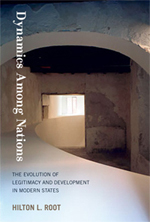SUMMARY
Liberal internationalism has been the West’s foreign policy agenda since the Cold War, and the West has long occupied the top rung of a hierarchical system. In this book, Hilton Root argues that international relations, like other complex ecosystems, exists in a constantly shifting landscape, in which hierarchical structures are giving way to systems of networked interdependence, changing every facet of global interaction. Accordingly, policymakers will need a new way to understand the process of change. Root suggests that the science of complex systems offers an analytical framework to explain the unforeseen development failures, governance trends, and alliance shifts in today’s global political economy.
Root examines both the networked systems that make up modern states and the larger, interdependent landscapes they share. Using systems analysis—in which institutional change and economic development are understood as self-organizing complexities—he offers an alternative view of institutional resilience and persistence. From this perspective, Root considers the divergence of East and West; the emergence of the European state, its contrast with the rise of China, and the network properties of their respective innovation systems; the trajectory of democracy in developing regions; and the systemic impact of China on the liberal world order. Complexity science, Root argues, will not explain historical change processes with algorithmic precision, but it may offer explanations that match the messy richness of those processes.
BRINGING COMPLEXITY INTO GLOBAL POLICY
DYNAMICS AMONG NATIONS employs insights from the study of complex systems to examine the interdependent, networked environment of today’s global power transitions – as well as the rise and fall of empires in Europe and Asia.
For too long, policymakers and economists have tackled problems of institution building, governance, and economic policy reform by asking, “What is the best solution” or “What should we address first”? When the problems they face are complex – not just complicated – these are the wrong questions.
Complex problems arise from complex systems made up of networks of interacting agents – families, ruling coalitions, governmental bureaucracies, markets, unions – that influence each other within the larger system. The behavior of one agent affects the behavior of another, and the resulting dynamics produce novel and powerful self-organizing behaviors in other agents sharing the system, and create a spiral of feedback loops and linked responses.
When does a component recognize that it is a contributing agent? Do the parts know they are a wave? The study of complexity helps us recognize the significance of individual change in terms of the larger pattern or system of which it is a part.
ESSENTIAL LESSONS FOR GLOBAL STABILITY
We must learn to view the entire landscape of interacting units as a complex system – and learn to identify feedbacks and interdependencies that affect different actions. Only then can we build a strategy that is sufficiently dynamic and adaptive to attain desired outcomes in a constantly changing environment.
ENDORSEMENTS
“Hilton Root examines international relations from the perspective of complexity theory, the science of the twenty-first century. His analysis will compel a complete re-thinking of the current dominant narrative on globalization, with its assumption of convergence to Western liberal values. A very original, well-written, and highly thought-provoking book.”
—Paul Ormerod, Partner, Volterra Partners
“A creative and sophisticated treatment of the dynamics of global change. By fleshing out the notion of a ‘networked global society,’ Root at once makes an important theoretical contribution and advances our understanding of the interdependent—yet decentralized—world that lies ahead.”
—Charles A. Kupchan, Georgetown University and Council on Foreign Relations, Author of No One’s World
“As China gets richer, why is it not becoming more like the West? Because, says Hilton Root in this outstanding new book, development does not work the way that most social scientists think. Borrowing the tools that natural scientists use to explain evolution and complex systems, Dynamics among Nations reveals the hidden logic behind global economics, governance, and security. Everyone who wants to understand how our world is changing should read this compelling book.”
—Ian Morris, author of Why the West Rules—For Now
Questions from Dynamics among Nations on Global Development (Chinese Version)
On China’s Role in the Network Structure of International Trade:
- What positive forces of attraction will enable China to become the center of a network of developing nations?
- Will China’s centralized hub-and-spoke network integrate with the distributed, more decentralized network structure of the global economy?
Questions from Dynamics among Nations … On Comparative World History:
- Why was China unprepared to meet the challenge of Europe’s industrialization and global domination, despite being unified under a single emperor for much of its history? Why, in fact, did the Industrial Revolution take place in Europe, and not China?
- Why were military innovations like the use of gunpowder or cannon – which put the class basis of social order at risk – diffused in Europe but resisted in other world regions, most notably in China, where they originated?
Questions from Dynamics among Nations… On Global Stability and the Liberal World Order:
- Can international stability be maintained when a core group of liberal democracies no longer dominates but is joined or even supplanted by the rising non-Western powers formerly on the periphery of global trade or production? Will a full-blown crisis or authority unfold, as the universality of liberal internationalism becomes a more fractious issue?
REVIEWS
- Governance (Yi Feng)
- JASS, Vol. 18, Issue 4, October 2015 (Armando Geller)
- Journal of Economic Issues, Vol. XLIX, No. 5, 2015 (Vikas Kumar)
- Policy and Complex Systems, Vol. 1., No. 2, 2014 (David Hales)
- Institute of Economic Affairs (Paul Graham)
- London School of Economics Book Review Forum (Peter Trubowitz)
- Response to Peter Trubowitz (Hilton Root)
- Understanding Society (Daniel Little)
- Public Intelligence Blog (J.P. Massing)
- Amazon Reviews
DYNAMICS AMONG NATIONS IN THE NEWS
“Ten minutes with Hilton Root,” author of Dynamics Among Nations, The MIT Press, November 18, 2013.
“After Liberalism: Complexity in the Governance of a Networked Global Society,” World Financial Review, March/April 2014.

